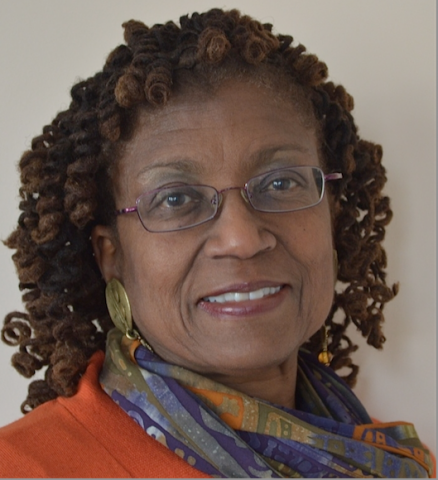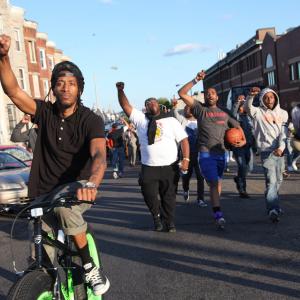
Rev. Valerie Miles-Tribble (@CantBeStill) is associate professor of ministerial leadership and practical theology for the American Baptist Seminary of the West. She is an ordained pastor and womanist theologian/activist. Find her on Twitter at @CantBeStill.
Posts By This Author
What the Movement Has Learned from Eric Garner

Image via Rena Schild/ Shutterstock
What we’ve learned three years after Eric Garner’s death is that we can’t give up on God’s mandate for justice, incarnated in the gospel’s good news. If we trust and believe that selfish agendas of special interests will not prevail, we are compelled instead to believe that love will conquer hate.
Weekly Wrap 7.15.16: The 10 Best Stories You Missed This Week
In the aftermath of a week of horrific killings, America is still reeling. This has given rise to my wonder about how America’s ideological, theological, and political upheaval may appear to the world. Here are 10 views that no doubt the world has witnessed. I hope they also inspire us to action.
Trayvon, Sandra, Tamir: Calling on Our Great Cloud of Witnesses
Here’s an irony: Standing at the memorial tree and experiencing a cloud of witnesses on this February day during Black History Month did indeed strengthen our resolve to keep fighting through the tears and the pain. We were mindful that on this particular day — Feb. 18, 2016 — the family of Sandra Bland would assemble later in the afternoon at the Houston Courthouse to hear response to their appeal for justice to be meted upon the Waller County sheriff and police. Our cacophony of voices called upon the Holiest of Holies to break the yoke of evil systems in which cronyism and political agendas thrived.
Can You Hear It?
Hip-hop, spoken word, and the voice of prophetic ethics.
JUSTICE-CONSCIOUS clergy and theologians have been drawn to the Black Lives Matter movement by resonating eschatological beliefs and prophetic ethics. However, movement motivations differ for many of the millennial activist leaders whose ethical sensibilities and theological worldview are not framed necessarily by doctrinal faith, ecclesiology, or trust in the church as an arbiter of God’s right and wrong.
Instead these millennial activists, unlike the boomers allied with them, relate to ethical messages found in popular cultural streams of hip-hop and spoken word that voice this generation’s pervasive questioning about theodicy—the presence of good and evil—in the world. These lyrical works articulate a generational critique of lived experiences that warrant further ethical and theological analysis. The challenge for the church and its faith leaders is: Do we listen?
In a Sojo.net post last August, I noted that the 2015 anthem chant “Hell You Talmbout,” by Janelle Monáe and Wondaland, voiced an ethical polemic on prevalent state-sanctioned practices of extrajudicial injustice. The chanted names of those killed serve to demand their remembrance as persons. As a rallying cry across the nation, the call-and-response lyrics convey a hymnody challenging the anonymity of invisibility.
Similarly, rap artist Kendrick Lamar’s 2015 song “Alright” was rapidly adopted in the Black Lives Matter movement as a counterhegemonic anthem that pushed against police violence with a first-person examination of mortality on the margins.
Lamar’s lyrical messaging in “Alright” linked cultural expression with socio-theological meaning to craft a survival ethic. Intentional use of the N-word sears the embedded consciousness of an older generation for whom the term is historically tied to the evils of slavocracy and Jim Crow segregation. However, Lamar intentionally turns to the signifying trope and demoralizing images that cast “othered” black and brown bodies into racially pejorative stereotypes. In the present millennial context, the N-word is used as a catchphrase of familiarity among peers but is also acknowledged as a pejorative used by police to identify or label black bodies—as many audio-visual recordings of incidents attest—while extrajudicial methods are physically applied. Use of repetitive lyrics in “Alright” amplifies an epistemological and ethical conundrum about systematized oppression. But do we listen?
Wouldn’t you know—we been hurt, been down before
N----, when our pride was low, lookin’ at the world like, “Where do we go?”
N----, and we hate po-po; wanna kill us dead in the street fo sho
N----, I’m at the preacher’s door
My knees gettin’ weak, and my gun might blow
But we gon’ be alright
The images in the video for “Alright” expose, with satirical irony and stark reality, that lived experiences in neighborhoods on the brink of ghettoized existence are linked to systemic control by powerful, privileged forces. Lamar’s juxtaposition of a bodily spirit in flight creates tension between the evils of oppression and a spiritual will to survive. This theoethical tension is captured when a voiced recognition of the “evils of Lucy” (Lucifer) all around is jolted into silence when a uniformed figure fires a single gunshot that sends Lamar’s black body careening off the high perch of a street light.
'Hell You Talmbout?'
Protest Music Meets the Church in the Streets

Screenshot via Scene Media/YouTube
But unlike those infused with the sacristy of church hymnody sung during the civil rights era led by Rev. Dr. Martin Luther King in the sanctuaries of Southern congregations, there is street cred in "Hell YouTalmbout" and other millennial anthems of the Black Lives Matter movement.
Anthems as hymns crafted for the public square raise challenging lyrics that are no less spiritual, yet are intended for civic conversion of societal systems and strictures rather than individual conversion of internalized salvation.
And just as young celebrities increasingly have come forward to add voice to the injustice of egregious brutality by police, Monáe also invokes a Christian profession of God as just judge against human injustices of racism, violence, and supremacist ideologies.
Are We Missing the Prophetic Connection?
Could it be that the crescendo of dissention is divinely synched to yet again heighten disruptive unease among the status quo? Could it be that the promise of Emmanuel — "God is with us" — as proclaimed by the heavenly host, but feared by powerful elite, is unavoidably linked through the eternal truth — such that even the Church universal cannot celebrate one and avoid the other? Could it be that through Advent, we are called to acknowledge the humanity and parity of personhood, rather than rest in the laurels of privilege? The anger of youthful Ferguson protests was marginalized and dubbed as riots, but could it be that this Advent response manifested in expanded multiethnic solidarity is of divine intent to raise challenge to elitism and to demand respect for people of color as equals rather than as patronized subordinates? Could it be that whether or not the media chooses to ignore the connection, the Advent message for those with ears to hear is that perpetrators of brutality, the comfortable protectors of privilege, and the self-serving pundits of power that tried to nullify the everlasting promise were unsuccessful then and now? Could it be by divine design that unknown names, stolen lives, are now divinely lifted to eternal and global recognition as sacrificial symbols so that truth could come to light?


